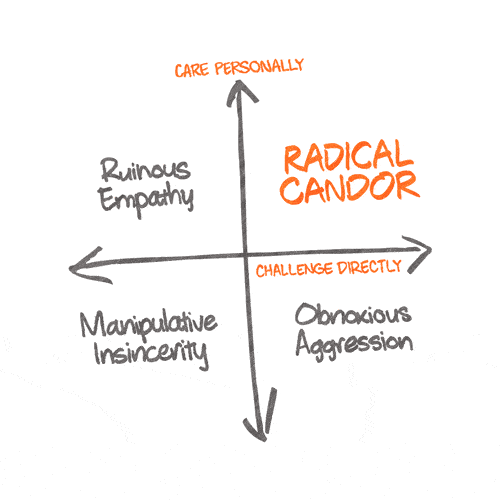Kim Scott is the author of Radical Candor: Be a Kick-Ass Boss Without Losing Your Humanity and Radical…
4 Steps to Building Strong Relationships With Your Peers, Boss & Direct Reports
The importance of good work relationships rooted in psychological safety cannot be overstated. Your ability to build strong work relationships determines the quality of everything that follows.
A psychologically safe workplace fosters creativity, enhances productivity and ultimately leads to higher employee engagement. On the other hand, a toxic work environment leads to quiet quitting, low morale and poor overall organizational performance.
Whether you’re part of a team or leading one, the ability to build and maintain positive work relationships is a vital skill.
Practicing the principles of Radical Candor — caring personally and challenging directly to communicate in a way that’s kind, clear, specific and sincere — can help you create a strong foundation for all of your work relationships.
Before we explore practical strategies and tips to help you develop strong and effective work relationships built on a bedrock of trust, let’s start with a quick Radical Candor refresh.
Need help with Radical Candor? Let's talk!
The Four Quadrants of Radical Candor
Radical Candor can be visualized through a simple framework known as the Radical Candor 2×2 Matrix, which has four quadrants:
- Obnoxious Aggression: This is when you challenge directly but fail to care personally. It can come off as insensitive and abrasive, damaging relationships.
- Ruinous Empathy: In this quadrant, you care personally but avoid challenging directly. It’s characterized by a desire to be nice, but the fear of giving feedback can lead to poor performance and missed growth opportunities.
- Manipulative Insincerity: Here, neither care nor challenge is present. It’s a space of passive-aggressiveness and hidden agendas, which can erode trust and hinder collaboration.
- Radical Candor: The sweet spot. In this quadrant, you care personally for your colleagues and challenge them directly. It promotes an environment of mutual respect and support, fostering growth and strong work relationships.
How to Build Good Work Relationships with Radical Candor
1. Communication is Key for Good Work Relationships
The foundation of any successful relationship, be it personal or professional, is effective communication. To build good work relationships:
- Listen Actively: The foundation of Radical Candor is active listening. Take the time to understand your colleagues, their concerns, and their aspirations. Listening shows that you care personally about them as real human beings.
- Get and Give Feedback: Express your ideas and concerns clearly and openly, allowing your colleagues to understand your perspective. This means soliciting feedback before you give it and rewarding people for telling you what they really think. When you do deliver feedback, focus on giving praise that is specific and sincere so people know how to repeat success and criticism that is kind and clear so folks can understand mistakes and learn from them.
- Feedback Loops: Establish regular feedback loops to discuss goals, performance, and any concerns. Encourage open, honest discussions, and create a safe space for your colleagues to share their thoughts and concerns. This should happen during regular one-on-one meetings and in frequent impromptu feedback conversations.
- Embrace Vulnerability: Radical Candor is about being vulnerable and open. Share your own experiences and challenges to create a sense of trust and camaraderie within the team to build strong relationships at work.
2. Foster Trust In Your Work Relationships
Trust is the bedrock of any solid relationship. To gain and maintain trust at work:
- Keep Your Promises: If you make a commitment, follow through on it. Reliability is a significant factor in trust-building.
- Be Transparent: Honesty and openness in your actions and decisions will go a long way in establishing trust.
- Respect Confidentiality: Be trustworthy by keeping sensitive information confidential.
- Challenge Directly: Challenging others and encouraging them to challenge you helps build trust because it shows you care enough to point out both the things that aren’t going well and those that are. It also demonstrates that you are willing to admit when you’re wrong and you’re committed to fixing mistakes that you or others have made.
3. Show Empathy and Respect In Your Work Relationships
Understanding and respect for your colleagues are essential for a supportive work environment:
- Empathize: Put yourself in your colleagues’ shoes and acknowledge their feelings and concerns. You have to walk a fine line between empathy and Ruinous Empathy. Be careful not to let your concern for others stop you from telling them things they’d be better off knowing.
- Celebrate Diversity: Respect and celebrate the differences in your team. A diverse group of individuals can bring unique perspectives and strengths.
- Value Everyone’s Contributions: Acknowledge and appreciate the contributions of your colleagues, regardless of their role. Public praise is a great way to show everyone what good looks like.
4. Conflict Resolution Skills are Vital for Strong Work Relationships
Conflicts are a natural part of any relationship, but knowing how to handle them is crucial:
- Address Issues Early: Because challenging directly often involves disagreeing or saying no, this approach embraces conflict rather than avoiding it. While it’s so tempting to avoid conflict, resolving conflict — and resolving it quickly — is one of the things that we can do to build trust.
- Facilitate Clean Escalation: If you’re the boss, there will be times when people on your team will encounter a conflict they can’t resolve without your help. When this happens, offer to have a three-way conversation to discuss the issue. Each party will tell their side of the story with the other present, avoiding the one-sidedness and exaggeration that may come up in triangulation. Your role is to help the two parties come up with a solution they both can understand and live with.
- Manage Your Own Emotions: Keep your emotions in check during conflicts and focus on the issue at hand. A big part of being a manager is “emotional labor.” You have to react compassionately to other people’s emotions without expecting them to do the same for you in return.
- Seek Common Ground: Work together to identify where you do agree, then focus on committing to a course of action.
Building good work relationships is not just about professional networking; it’s about creating a collaborative and supportive work environment of Radical Respect where individuals can thrive.
Strong work relationships built on a foundation of Radical Candor are a powerful asset that can drive both individual and organizational success. Start embracing this approach today, and watch your professional connections flourish.
————————————————————————————————————————————————————————————–
- Take the Radical Candor quiz >>
- Sign up for our Radical Candor email newsletter >>
- Listen to the Radical Candor podcast >>
- Shop the Radical Candor store >>
- Get Radical Candor coaching and consulting for your team >>
- Get Radical Candor coaching and consulting for your company >>
Need help with Radical Candor? Then you need The Feedback Loop (think Groundhog Day meets The Office), a 5-episode workplace comedy series starring David Alan Grier that brings to life Radical Candor’s simple framework for navigating candid conversations.
You’ll get an hour of hilarious content about a team whose feedback fails are costing them business; improv-inspired exercises to teach everyone the skills they need to work better together; and after-episode action plans you can put into practice immediately to up your helpful feedback EQ.
We’re offering Radical Candor readers 10% off the self-paced e-course. Follow this link and enter the promo code FEEDBACK at checkout.








